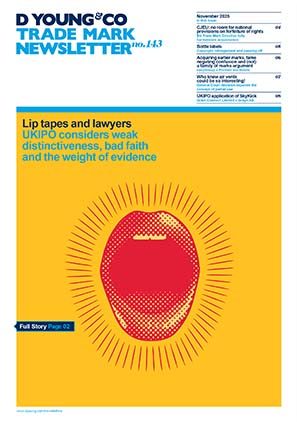Anonymity is not a laughing matter: Banksy’s trade marks declared invalid on the grounds of bad faith
In a series of recent developments at the EUIPO, Full Colour Black Limited (a graffiti card company) has been successful in five cancellation actions filed against EUTM registrations held in the name of Pest Control Office Limited (Banksy’s deemed legal representatives).
The declarations of invalidity were brought by Full Colour Black against EUTM registrations for signs relating to famous artworks by Banksy, including: “Laugh now”, “Love rat”, “Girl with an umbrella”, “Radar rat” and “Bomb hugger”. Mirroring the outcome of the “Flower thrower ” (sometimes referred to as “Flower bomber”) case reported on last year, the Cancellation Division declared the EUTMs invalid on the grounds of bad faith.
Trade marks, copyright and bad faith
One of these cases involves the famous work “Laugh now, but one day we’ll be in charge”, which was created by Banksy in 2002 on the commission of a Brighton nightclub. The original work depicts ten monkeys with signs around their necks, some of which are blank and some of which feature the aforementioned wording, whilst the EUTM filed and declared invalid comprised a single monkey with a blank sign.
The “Laugh now” EUTM was filed in November 2018, in classes 9, 16, 25, 28 and 41 and the mark reached registration in June 2019. Absolute grounds are not available at the opposition stage in the EU (unlike in the UK), and an invalidation was filed in November 2019 against the EUTM on the grounds of bad faith as well as claiming that the mark lacked distinctive character and was descriptive. The EUIPO rendered its decision in “Laugh now” - and indeed on the other four cases - entirely on the grounds of bad faith.
In finding there had been bad faith in all of these decisions, the EUIPO considered it was clear that, at the time of filing the applications, Banksy did not have a genuine intention to use the signs as trade marks in relation to the goods/services covered.
All decisions recognised Banksy’s predicament that copyright enforcement cannot follow without Banksy revealing his identity, which would undermine his persona. However, the EUIPO also reasoned that as Banksy is anonymous, he cannot be clearly identified as the unquestionable owner of the copyright. Thus, the Cancellation Division held that Banksy cannot use potentially unlimited trade mark protection to gain legal rights in a sign where he could not rely on copyright, noting that it is not a trade mark’s function to uphold rights which may not exist for the person claiming to own them.
Other factors at play included:
- The original artistic works were graffiti in a public place (rather than on Banksy’s own property or canvas);
- In his book “Wall and Piece”, Banksy had stated that “copyright is for losers” and he had previously acknowledged his artwork was widely photographed (the EUIPO noted that Banksy’s contempt of IP rights would not annul validly acquired rights);
- Banksy had allowed the public to download and use his artwork (as long as it was not for commercial purposes);
- Banksy had stated on his website that he was aware of third parties using his works and denied this was done with his permission, but took no legal action to prevent the same; and
- Banksy only started using the sign after a declaration of invalidity had been filed against one of his trade marks – it was noted that Banksy’s opening of an online shop was with the express purpose to undermine issues of non-use in a trade mark dispute.
The EUIPO did not substantively comment on Full Colour Black’s claim that there had been a pattern of registering Banksy’s artwork as trade marks in the EU and using the EUTM as a basis for trade mark registrations in the US.
Keep IP ownership on your radar
It remains to be seen whether Pest Control will file appeals against these decisions. The “Flower thrower” decision from 2020 was not appealed, but a new EUTM for the “Flower thrower” mark has reached registration and is now pending separate cancellation proceedings.
Whilst the EUIPO did not comment on the trade mark registrability of famous works of art, the Cancellation Division did note that copyright and trade marks in general are not mutually exclusive. Indeed, logos, for example, can fall under the remit of copyright, designs and trade marks. However, this case highlights the issues surrounding enforcement of IP where ownership and the chain of title is questioned and an artist/designer remains anonymous.

